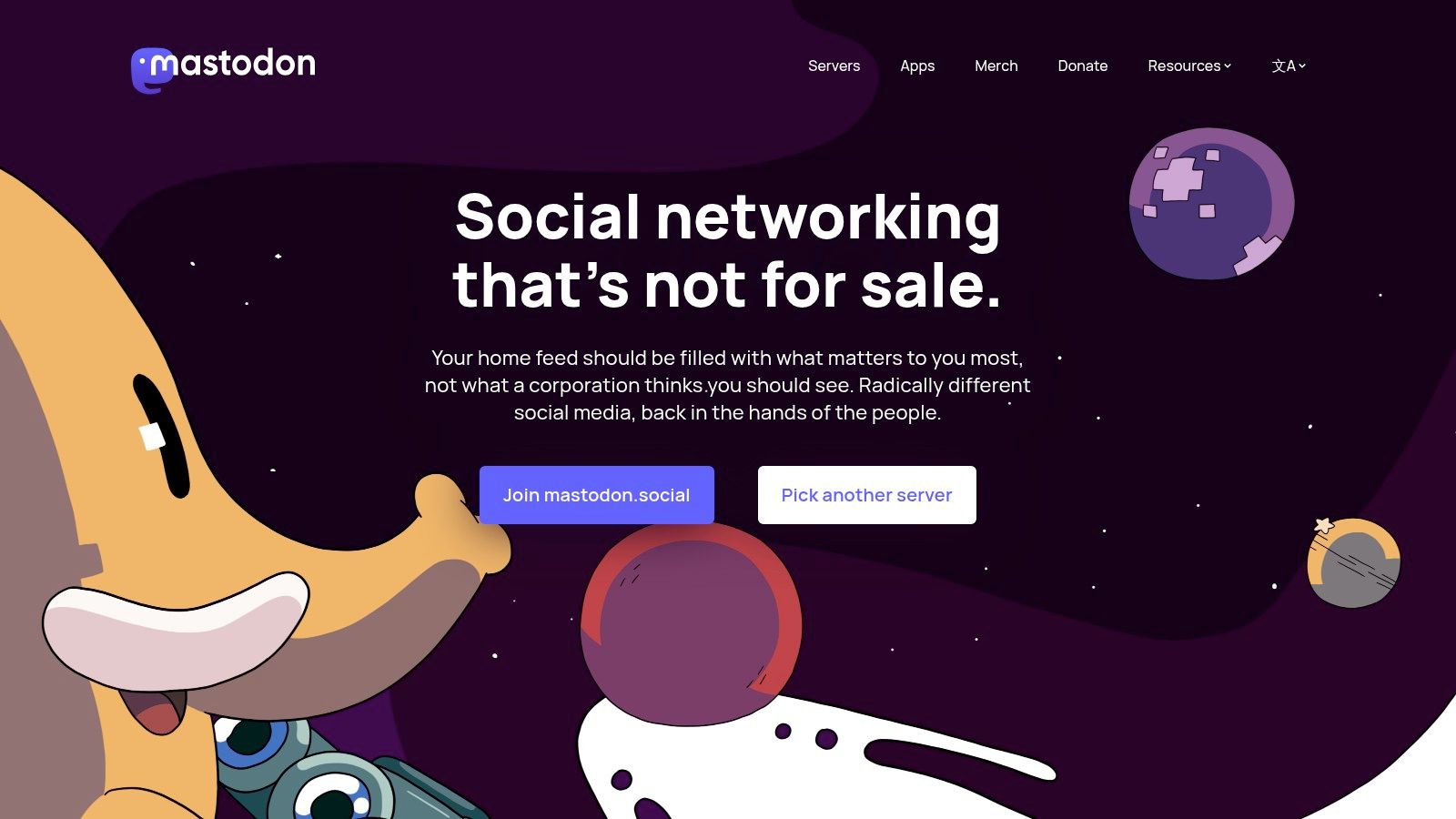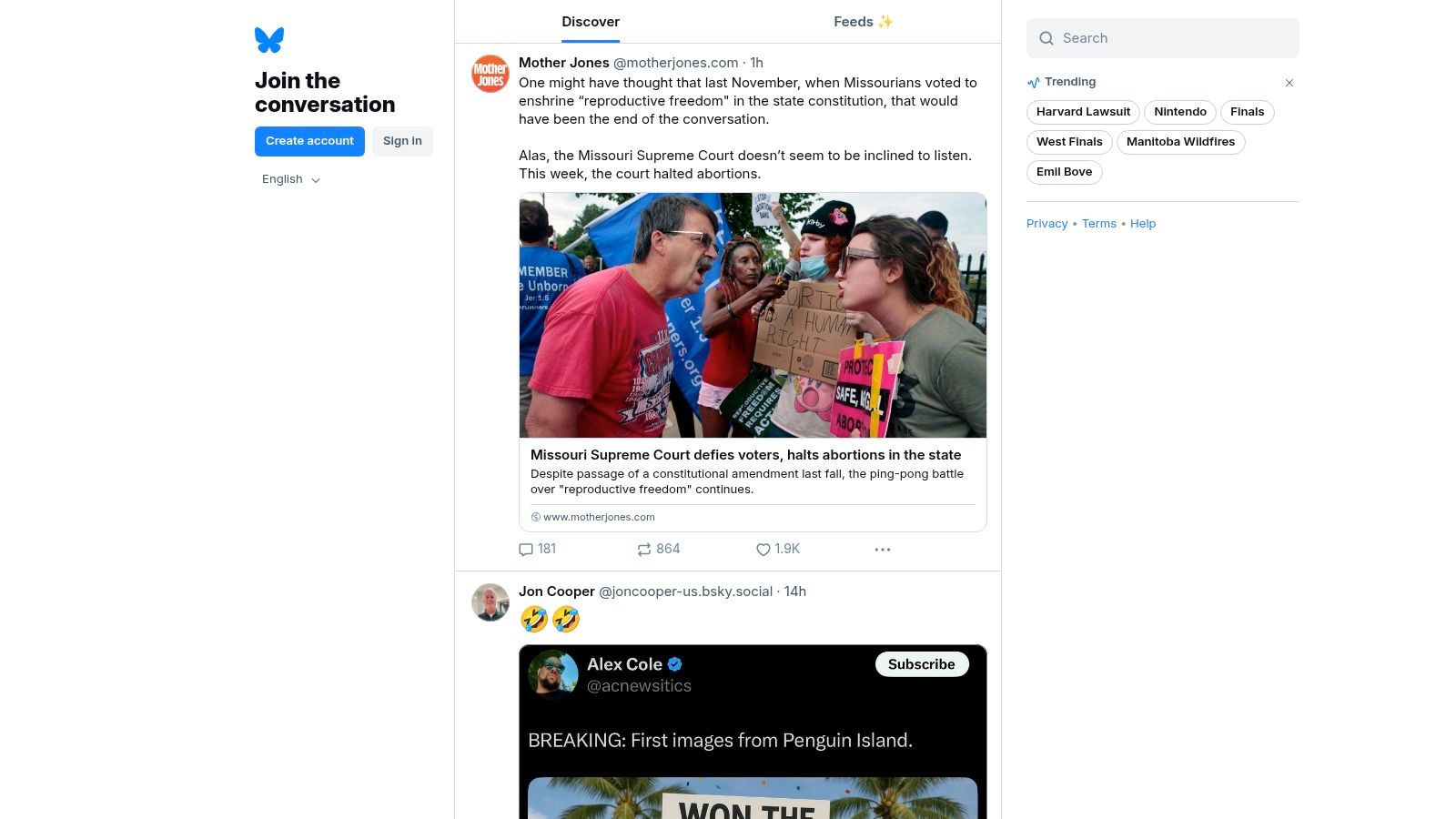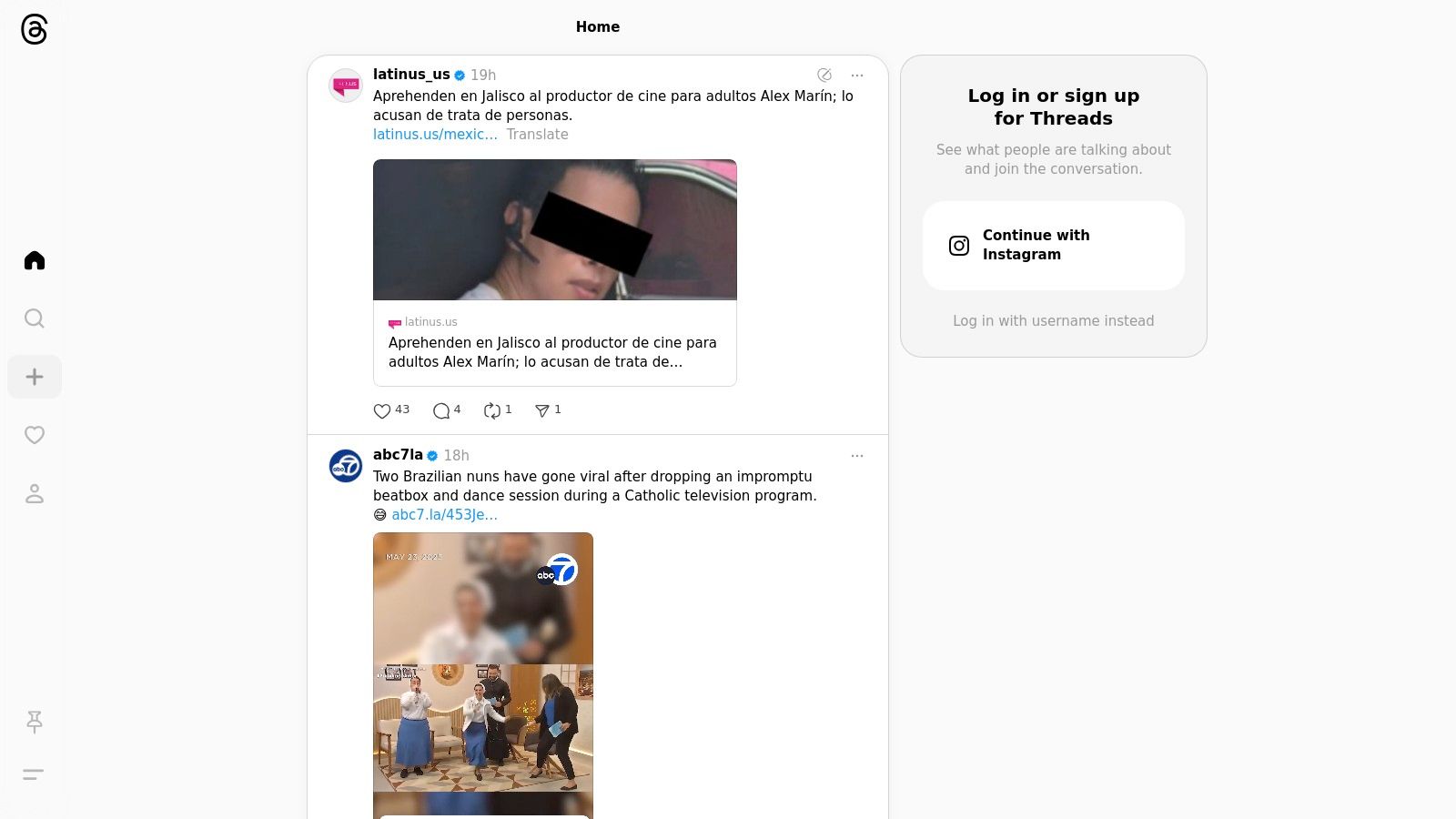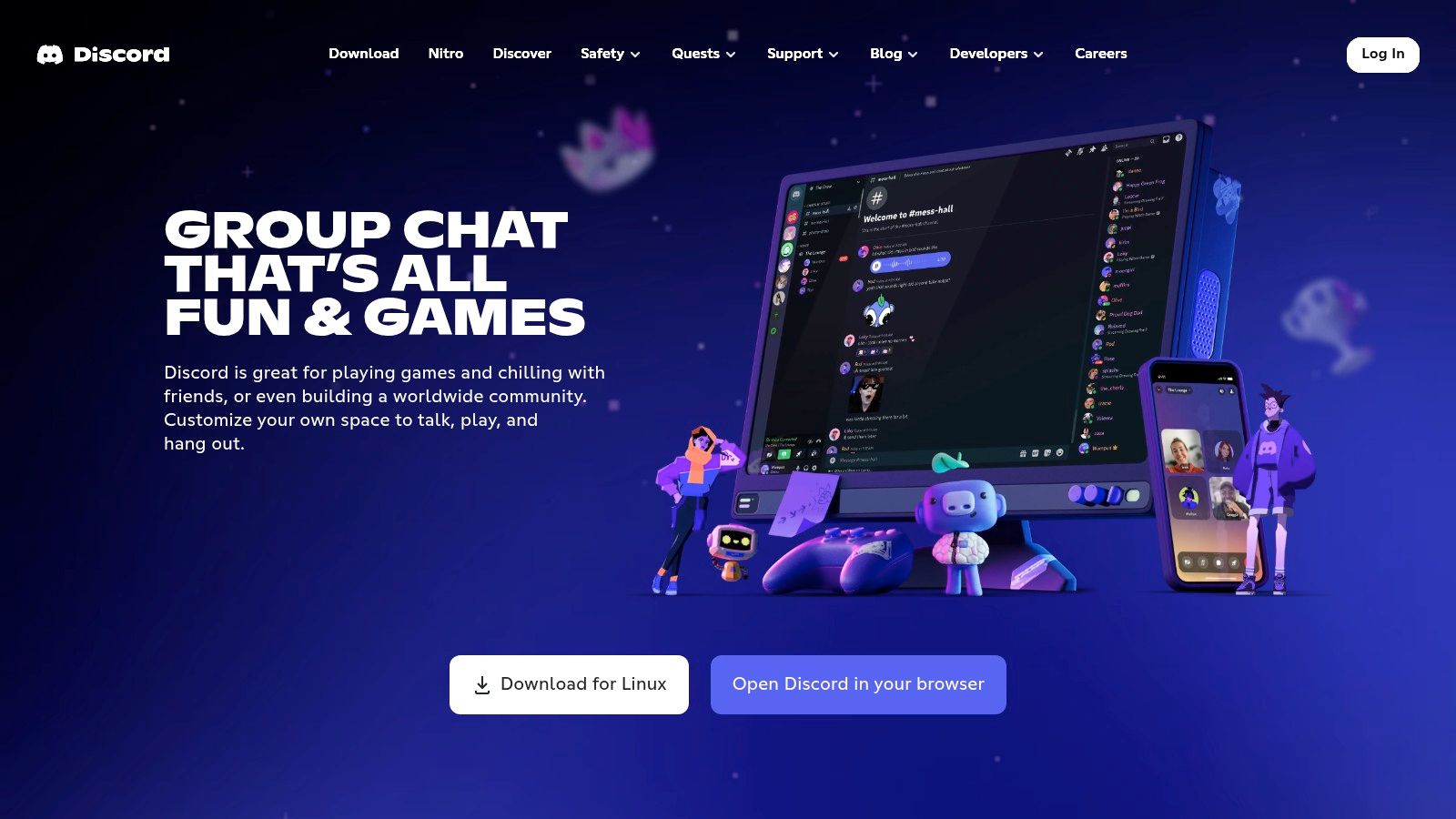Beyond the Bird: Exploring Decentralized Social Media
Fed up with traditional social media platforms? Make your move with this listicle that pits six different alternatives, such as Mastodon versus Bluesky, side by side so that you, the user, can take back control of your digital identity. Read on and see the strengths and weaknesses of different platforms such as Twitter/X, Threads, Discord, Reddit, and more.
1. Mastodon
In the pursuit of finding a social media experience that focuses on giving users control, a sense of community, and greater privacy, Mastodon emerges as a strong alternative within this space that competes with Bluesky, Twitter, and other centralized platforms. Unlike Twitter, Bluesky, and other platforms, Mastodon is a decentralized, open-source social network that is built atop the ActivityPub protocol. What this essentially goes on to say is that this is not a centralized service that is controlled by a single firm, but essentially a network that consists of multiple servers, called instances, which operate independently. It’s much like your email address, for example. Just as you may use your Gmail address, but still be able to communicate with someone who may use Yahoo Mail, with Mastodon, you can easily use any instance, so that you may still communicate with users on other instances.

Content creators, influencers, companies, and individuals wanting more control over their digital space will be attracted to Mastodon’s powerful arsenal of tools. Just think of being able to launch your own branded node for your firm, giving you the ability to host your own community and control the dialogues. It’s ideal for agencies wanting more control over the communities they host. What will likely attract developers as well as privacy-conscious organizations is that Mastodon is open source, enabling them to see everything that’s going on. It’s the ability to customize the service as well as contribute to its development that gives them such control as opposed to Bluesky, which is closed source.
Features such as those on Mastodon further enhance its position within the debate of “Mastodon vs Bluesky” as highlighted below. With its chronological list that is unaltered by algorithms, users of this network see postings as they happen, thus allowing them to experience more of reality as opposed to that found on other platforms. Enhanced filtering capabilities allow users to control their environment, thus reducing instances of harassment. Emojis, content warnings, as well as visibility settings, allow for more personalization.
Among the most important aspects that distinguish the comparison between Mastodon and Bluesky is the issue of ownership. In this regard, Mastodon is free, with the absence of any advertising-based monetization model. Moreover, its decentralized system eliminates any form of control from any central body, thus addressing the issues associated with censorship, as well as the exploitation of data that come with centralization. This tackles the issues of concern related to privacy and algorithms.
Nevertheless, the federated system is not without its pitfalls. Instance choice may pose difficulties for new users. Also, every instance may operate with its own set of rules, culture, or policies. Although compatibility enables users to communicate with users in other instances, the varied nature of the user interface may pose some difficulties. Again, the reduced size of the user population compared with the size of Bluesky may pose some difficulties. Finally, the reliance on volunteer system administrators may pose some limitations.
Pros of Mastodon:
- Complete user control: Over data, privacy settings, and community moderation.
- No corporate ownership or advertising: A refreshing change from the ad-driven models of mainstream platforms.
- Strong community-driven moderation and governance: Fostering a safer and more respectful online environment.
- Interoperability with other ActivityPub-compatible platforms: Expanding the potential for cross-platform communication.
Cons of Mastodon:
- Steep learning curve: Understanding federation and choosing an instance can be initially confusing.
- Fragmented user experience: Navigating different instances with varying rules and cultures.
- Smaller user base: Potentially limiting reach compared to larger, centralized platforms.
- Instance reliability: Dependent on the efforts of volunteer administrators.
For those willing to navigate the initial complexities of the federated model, Mastodon offers a unique value proposition: true ownership and control over your online social experience. If you value privacy, community, and freedom from algorithmic manipulation, exploring Mastodon (https://joinmastodon.org) is a worthwhile endeavor in the Mastodon vs Bluesky comparison.
2. Bluesky
Bluesky positions itself as a decentralized alternative to traditional social media platforms such as Twitter, providing a user experience that is effectively the same as Twitter, with a focus on user control, data portability, and openness. Bluesky, built on the AT Protocol (Authenticated Transfer Protocol), aims to provide a better service than traditional platforms that, in many ways, limit users, giving users more control over their activity on the internet. Bluesky, therefore, provides a powerful alternative within the “Mastodon vs. Bluesky” scenario, taking a different approach to decentralized social networking.

Content creators, as well as social influencers, see value in Bluesky as the tool may allow them to gain followers without being controlled by algorithms and content limitations, as seen on platforms such as Twitter. Of course, the algorithmic choice feature is most applicable in this regard, as users will be able to design their own algorithms, allowing them to communicate with even more individuals. Just imagine being able to pick the algorithm that promotes interaction with your group of people or that provides industry-based information.
Small to medium-sized enterprises will be able to use Bluesky as a tool for engaging with their targeted audience more sincerely than before. Being decentralized, the social media service promotes a community that, if leveraged, may be directly beneficial for cultivating brand loyalty. Data portability between services provides a sense of future-proofing, protecting valuable customer information that might otherwise be lost if the service changes its terms or ceases operation.
Digital marketing firms as well as corporations with internal social media management teams will welcome the Bluesky interface, as it will be relatively straightforward to integrate into their existing processes. Having the ability to use custom domain names is a huge boon as a branding tool, allowing companies to present their brand identity consistently across multiple different platforms. Finally, Bluesky’s approach to transparency and control will resonate with the public’s increasing concern for responsible use of social media.
Naturally, developers as well as privacy-concerned organizations would be attracted to the decentralized nature of Bluesky’s design. With the AT Protocol, greater degrees of flexibility as well as compatibility can be achieved, which will allow developers to develop innovative third-party applications that will perfectly interact with the Bluesky network. Consequently, the openness of Bluesky’s design will promote a collaborative space that will allow developers to participate in the development of Bluesky.
At present, Bluesky is invite-only, giving the service some level of exclusivity. However, this might also limit its usage. Being invite-only is one of the primary distinguishing aspects of “Mastodon compared to Bluesky” as Mastodon is entirely open. Bluesky, although free, seems limited as users would still require invites. However, Bluesky currently lacks any paid services. At this stage, users would essentially require internet connectivity along with a smartphone or computer that is Bluesky compatible. Joining Bluesky as a user isn’t really different from other social networks.
Although Bluesky is highly promising, some limitations must be considered. Bluesky is still in its development stage, so its feature sets can still change. Limited third-party clients mean that users will mostly use the native application. Also, although Bluesky encourages a decentralized system, some centralized elements still persist in its design. Taking into consideration Mastodon, Bluesky’s federation system is still immature, so interaction with other decentralized social networks in the fediverse is limited.
Despite these limitations, Bluesky’s intuitive user experience, particularly for Twitter migrants, combined with its strong financial backing and a professional development team, positions it as a serious contender in the evolving landscape of decentralized social media. Its focus on algorithmic choice, data portability, and a user-friendly interface sets it apart, making it a compelling alternative to both traditional centralized platforms and other decentralized options like Mastodon. The future of Bluesky will depend heavily on how it navigates the challenges of scaling its platform while maintaining its commitment to decentralization and user empowerment. The official website (https://bsky.app) provides further information and access to the waitlist for those interested in experiencing Bluesky firsthand.
3. Twitter/X
Twitter, now renamed as ‘X,’ represents a vital point of comparison in the debate between Mastodon and Bluesky, despite the fact that Twitter, unlike its peers, is not a decentralized network. Its importance lies in its being a primary destination for many users moving from Twitter/X, requiring users to familiarize themselves with its services, advantages, as well as disadvantages compared to other platforms. Twitter, with its acquisition at the hands of Elon Musk, remains a significant player in the world of micro-blogging services with its vast globalodiac, exerting immense influence as a tool for getting the word across. However, its recent transformations, with its new policy on moderation as well as the ‘Paid Verification’ system, may have caused some users to look elsewhere.

It’s essential for content creators, as well as businesses, that they familiarize themselves with the history of X. The services that this application provides its users range from real-time global conversations with trending topics, Spaces for live audio conversations, to sophisticated search capabilities. Then there’s the Premium service, which, as its name suggests, offers verification (which really is the most sought-after service in the new world of the ‘no-more-blue-check’ era) as well as some other incentives, such as the editing of tweets, ultimatum rankings within conversations, as well as search. Unfortunately, this premium service also illustrates the continuing struggles that this application may face: monetizing their free services.
One of the key attractions associated with X is its vast number of active users, allowing for unparallelled reach. With its established use within news circles, as well as its established usage within public discourse, it is a tool that can be used for either the promotion of one’s views, or staying up-to-date on the happenings of the world. When it comes to the use of this tool within a commercial environment, especially one targeted towards a wide audience, advertising tools through this service can provide much value.
However, the centralized nature of X makes it prone to changes in policies as well as changes in direction, which depend entirely on the policies of its owners. This makes the platform difficult for users as well as businesses that must conduct their operations within the framework of consistent policies. Algorithmic timelines may also affect how posts appear, which may prevent some posts from reaching their intended audiences organically. Finally, issues with moderation policies on X have been constant, with some users expressing their views that this might result in censorship. With the introduction of the payment policy for verification, this makes authenticity difficult, with some users getting prominence over others.
For those considering migrating to Mastodon or Bluesky, X provides a baseline for comparison. Mastodon and Bluesky offer decentralized alternatives that address some of the concerns users have with X’s centralized control and policy changes. However, neither platform currently matches X’s sheer scale and reach. This is the key tension for content creators: balancing the stability and community-driven nature of decentralized platforms against the extensive reach offered by X. Thinking about scheduling a Twitter thread for your content strategy? Learn more about Twitter/X to optimize your use of the platform while considering these alternatives.
Ultimately, the decision of whether to stick with X or explore alternatives like Mastodon or Bluesky depends on individual needs and priorities. X remains a powerful platform for reach and engagement, but its centralized nature, policy fluctuations, and evolving monetization strategies present challenges for users seeking greater control and transparency. Understanding these trade-offs is key to navigating the evolving social media landscape and making informed decisions about which platforms best serve your goals. Visit https://x.com to explore X’s features and functionalities firsthand.
4. Threads
Threads, Meta’s Twitter rival, also dubbed as the Twitter alternative, has quickly become a prominent player in the field of micro-blogging. Although this listicle will mostly deal with Mastodon compared with Bluesky, the entry of Threads, as well as its intended integration with the fediverse, is a fact that must be considered, regardless of your interest in decentralized social media platforms. Developed by the team behind Instagram, Threads takes advantage of its billion-strong existing user database, as well as its existing interface. Thus, if you don’t exactly want to plunge headlong into something entirely fresh, this might be a better alternative. It offers something that’s a kind of mix between traditional social media platforms and something that might, in the future, be able to connect with other platforms that support ActivityPub, such as Mastodon, further derailing the centralized versus decentralized distinction.

One of the most essential benefits of Threads is its seamless integration with Instagram. This enables users to sign up with their existing Instagram account, thus automatically importing their followers. This offers instantaneous access to a huge number of users, thus bypassing the slow and difficult process of starting right from scratch, which many platforms, such as Mastodon and Bluesky, provide. This aspect would be most desirable for content developers as well as influencers who would now require a quick fix solution that would allow them to quickly reach more users.
For users who are already managing multiple social media platforms, incorporating Threads into their existing system, such as that of a social media scheduler as reviewed in this social media scheduler article, would really come in handy.
To streamline your workflow, you can also use a dedicated Discord post scheduler to plan, automate, and publish content across your servers without manual posting.
In addition, Threads draws strength from the fact that Meta has extensive resources that guarantee the stability of the platforms as well as effective content moderation, something that might not easily be found in smaller, decentralized platforms. Meta’s established infrastructure provides efficient management of vast quantities of users as well as content, thus minimizing downtime as well as any technological issues. Their advanced content moderation tools, though fraught with controversies, provide users with the much-needed control as well as protection against harmful content that might take a significantly longer time to develop on other platforms, especially for brands seeking a positive online reputation.
However, the most intriguing feature of Threads, with regard to “Mastodon vs Bluesky”, would be the aforementioned ActivityPub federation. This would mean that users of Threads will be able to communicate with other users on other platforms within the fediverse, such as Mastodon. This will provide users with the “best of both worlds” in that users will enjoy the established user base of traditional social platforms, along with the ability and flexibility of decentralized platforms. This would be a ‘game-changer’ for users that would like alternative decentralized platforms outside of traditional centralized social behemoths.
However, Threads also has some cons. The most serious drawback would be the corporate control exercised by Meta, as well as its privacy issues. Meta’s record with users’ data is a contentious issue, and some users might be opposed to submitting their own data to this firm. Although this might appear as a positive aspect, its restrictions within the European Union because of regulatory issues limit its use. And, needless to say, requiring a link with the Instagram account would form a hurdle for users who would rather not use Meta’s services. Also, the unclarity with regards to the timeline of federating through ActivityPub would raise some doubts with regards to its decentralization.
For developers, as well as privacy-concerned groups, the reliance on Meta’s infrastructure may well be a huge turnoff. A lack of control over their data, as well as the possibility of being algortihmically manipulated, are valid considerations. The excitement with regard to the promise of “interoperability” is, as of yet, still to be seen. Until such time, the advantages of Threads would appear largely in its ease of use, existing user base, as well as the promise of integration with the Fediverse down the line. And, as things currently stand, until the “Mastodon vs Bluesky” drama dies down, Threads provides a tempting alternative for content creators, businesses, as well as individuals seeking a more familiar entranceway into this unfolding decentralized landscape of social media.
5. Discord
In any comparison between Mastodon versus Bluesky, often involved in the debate is the broader ecosystem of tools that interact with decentralized social media. Among such tools, surprisingly enough, is Discord. Although its original intended use was as a tool that would link gaming communities and group chats, Discord has grown into a notably large platform that is involved in social media conversations, especially for niche interests. In the scenario of a Mastodon versus Bluesky comparison, Discord is a critical component for enabling conversations, as well as helping users of decentralized social media platforms connect with one another. Many Mastodon servers, as well as new Bluesky communities, use Discord.

Discord’s server organization, along with its rich set of tools, makes it a perfect backstage area for decentralized social media projects. Just take, say, a Mastodon server for photography enthusiasts. They might use a Discord server as their hub for organizing photo walks, tips ‘n tricks, discussing governance for their instance, answering technological questions, and even running online workshops. Likewise, a Bluesky social network for, say, a specific interest, would use Discord as their hub for live conversations, getting feedback, as well as arranging meetups. This would help them achieve a much deeper level of interaction than would otherwise be possible.
Discord’s salient features play a pivotal role in its adoption as a tool in this scenario. Server-based organization, with the use of channels, roles, and other such facilities, helps facilitate proper communications. Simultaneous voice, video, as well as text messaging, enables flexible communications as required. The addition of bots helps control automated tasks such as sending welcome messages, moderating, as well as cross-posting on Discord/Mastodon/Bluesky. Thread-based conversations remain well-indexed, with facilities like screen sharing and streaming helpful in group events, tutorials, et cetera. It must be noted that all such services can be enjoyed in the free version as well. Nitro, a paid service, adds more services such as custom emojis, increased upload size, as well as HD resolution in video streaming.
Content creators, businesses, or social media managers thinking of the landscape presented by Mastodon versus Bluesky will see that Discord provides many benefits. Discord provides the ability to offer private communities that allow beta testing of content strategies, as well as exclusive membership. Social media advertising firms will use Discord as a tool for managing numerous decentralized platforms, as well as providing industry insights. Software developers or organizations that value privacy will use Discord for collaborative programming, reporting bugs, as well as discussing the future of decentralized social platforms.
Although Discord is a robust tool for the purposes of community-building as well as real-time messaging, it is necessary that users remain mindful of its limitations. Discord is not designed as a tool for public, broadcasting forms of social media, as is the case with Mastodon or Bluesky. Although its server-based design is ideal for well-contained communities, this feature may also serve as a silo, impeding further network development. There is restricted discovery, as with conventional forms of social media, as users must be invited into servers.
Creating a Discord server is pretty easy. You can download the application or use the web application, and then you will be able to set up a new Discord server. You will be able to give the server a name, set up channels, assign roles, and invite members through your unique link. Options for moderating your community will also be right in front of you.
In the ongoing debate between Mastodon and Bluesky, Discord takes a niche position that is unique in its own right. Although Discord is not a rival in this debate, for example, as Bluesky, Mastodon, or any other social media platforms, Discord remains a necessary component that provides a powerful tool for building communities, as well as other useful purposes. With its strong capabilities, ease of use, and rich ecosystem, Discord remains a resource that is valuable for use in the decentralized web social landscape.
6. Reddit: A Research Hub for the Mastodon vs. Bluesky Debate
When trying to decide if the benefits outweigh the disadvantages of relatively new social media networks such as Mastodon versus Bluesky, many individuals seek guidance through the use of Reddit. This is more than a social media site, though, as Reddit is a powerful tool for researching a variety of different topics, with its perspective on the complexities of decentralized social media being particularly insightful. With its social element, along with its strong organizational system, this tool is absolutely essential for anyone seeking information on the constantly changing digital landscape associated with social media.
Reddit’s strength is in its communities, which are called subreddits. These are community forums focused on a topic, such as forums specifically for Mastodon and Bluesky. In such forums, users can express their experiences with the platforms, engage in comparisons of the two platforms, and provide tips for those wanting to use them. This would give you a well-rounded perspective of the experience, going beyond that of advertising. Thus, you might use Reddit to see comparisons between the federated servers used in Mastodon versus the more centralized system used in Bluesky, or if users must set up their own Mastodon server versus getting a Bluesky invitation code.
The upvote/downvote system that the site provides is essentially a democratic tool for content curation. Thus, the better content will always float to the top, and this makes finding relevant information easier. This system provides valuable insights within the debate of Mastodon versus Bluesky. Such a democratic tool for content curation is essential for finding relevant information within the vast world of Reddit.
Reddit’s extensive comment threading system promotes in-depth explorations of particular aspects of each service. Participants can engage in detailed conversations, breaking down the minutia of services, privacy policies, and community elements. Such conversations often involve diving into the technical specifics of a service, offering wonderful insights for developers wanting explanations of the technology behind a service. Such in-depth discussions on Reddit set them apart from other services, enabling users to participate in truly in-depth analyses of the Mastodon versus Bluesky issue.
Moreover, the cross-posting abilities within relevant subreddits ensure that information becomes more accessible. Indeed, this allows more people to be aware of the information. For example, if a person wishes to see the comparison of the user interface of Mastodon and Bluesky, they can cross-post this thread within the subreddits that focus on user experience, social media marketing, as well as decentralized technology.
Reddit regularly hosts AMAs (Ask Me Anything) with platform developers and experts, offering direct access to valuable insights. These sessions provide an opportunity to ask specific questions about the future of these platforms and gain a deeper understanding of their development roadmap. This direct engagement with key players in the social media landscape provides an invaluable resource for those researching the Mastodon vs. Bluesky comparison.
While Reddit offers a wealth of information, it’s important to be aware of its limitations. The forum-style format differs significantly from the microblogging experience of Mastodon and Bluesky. This can be overwhelming for users seeking a simple social media experience, and it can sometimes be challenging to filter out the noise and find the most relevant information. The quality of discussion also varies significantly between subreddits, and real-time interaction is limited compared to Twitter-like platforms. Despite these drawbacks, Reddit’s unique strengths make it a powerful research tool for understanding the complexities of Mastodon vs. Bluesky.
Learn more about Reddit and its potential for business use cases: Learn more about Reddit. Leveraging this platform effectively can provide a significant edge in understanding the evolving social media landscape and making informed decisions about which platforms to adopt. For those seeking to delve deeper into the Mastodon vs. Bluesky debate, Reddit offers a treasure trove of insights, opinions, and technical analyses. Its democratic content curation and threaded discussions make it a powerful resource for anyone researching these emerging social media alternatives. Remember to explore multiple subreddits dedicated to each platform and related topics for a well-rounded perspective.
Social Media Platforms Comparison Matrix
| Platform | Core Features ✨ | User Experience ★ | Unique Selling Points 🏆 | Target Audience 👥 | Pricing/Value 💰 |
|---|---|---|---|---|---|
| Mastodon | Decentralized federation, advanced moderation, no algorithms | ★★★★☆ Steep learning, fragmented UX | Full data control, federated network, privacy | Privacy-focused users, communities | Free, open-source 💰 |
| Bluesky | AT Protocol, algorithmic choice, data portability | ★★★★☆ Intuitive for Twitter users | Twitter-like UI with decentralization | Twitter migrants, early adopters | Free, invite-only 💰 |
| Twitter/X | Real-time trends, paid verification, Spaces audio | ★★★☆☆ Largest base, algorithmic timeline | Massive reach, monetization for creators | Broad public, creators, brands | Freemium (X Premium) 💰 |
| Threads | Instagram integration, planned federation, cross-posting | ★★★★☆ Familiar Meta UI | Instagram user base leverage, established moderation | Instagram users, mainstream | Free 💰 |
| Discord | Server channels, voice/video chat, bots | ★★★★☆ Real-time, community-focused | Strong niche community building and moderation | Gaming & niche communities | Free + Nitro options 💰 |
| Subreddit topics, voting system, threaded discussions | ★★★☆☆ Forum style, less real-time | Deep discussions, democratic content curation | Discussion seekers, technical users | Free 💰 |
Choosing Your Decentralized Social Media Home
The decentralized social media landscape offers exciting alternatives to traditional platforms, with Mastodon and Bluesky emerging as key players. This article explored the strengths and weaknesses of several platforms, including Mastodon, Bluesky, Twitter/X, Threads, Discord, and Reddit, highlighting their unique approaches to community building and content sharing. The key takeaway is that there’s no one-size-fits-all solution. Whether you value Mastodon’s federated servers and open-source nature or Bluesky’s focus on algorithmic choice and portability, the best platform for you depends on your specific needs and priorities.
When making your decision, consider factors such as your target audience, content format preferences, and desired level of control. Planning your content in advance is essential for success on any platform. A helpful tool for this is a social media content calendar to map out your posting schedule and ensure consistent engagement. Whether you’re an independent creator, a business owner, or part of a larger team, understanding the nuances of Mastodon vs Bluesky is crucial for navigating the decentralized web.
The future of social media is decentralized, and choosing the right platform is the first step. Embrace the change, explore the possibilities, and find your online community. Streamline your decentralized social media presence with Postiz. Postiz allows you to manage and schedule your posts across multiple platforms, including Mastodon and Bluesky, making it easier than ever to connect with your audience in this evolving digital landscape.






